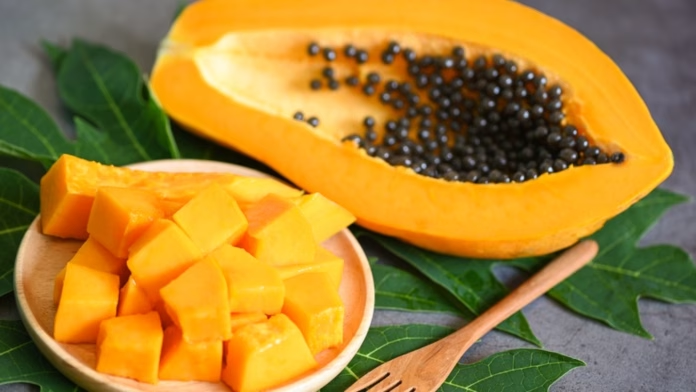As monsoon season approaches, the threat of dengue outbreaks looms large in many tropical and subtropical regions. Dengue fever, a mosquito-borne viral infection, poses a significant public health concern due to its rapid spread and potentially severe complications. Traditional preventive measures against dengue primarily involve mosquito control and personal protective measures. However, recent research has unveiled a surprising ally in the fight against dengue: papaya. This humble tropical fruit has shown promising potential in enhancing immunity and acting as a shield against dengue outbreaks. In this article, we delve into the scientific evidence supporting papaya’s role in dengue prevention, its nutritional benefits, and ways to incorporate it into your daily diet to safeguard yourself during the monsoon season.
Understanding Dengue and Its Impact:
Dengue fever is caused by the dengue virus, which is transmitted to humans through the bite of infected female mosquitoes, primarily the Aedes aegypti mosquito. The virus can lead to a wide range of symptoms, from mild fever and body aches to severe complications like dengue hemorrhagic fever (DHF) and dengue shock syndrome (DSS). According to the World Health Organization (WHO), an estimated 390 million dengue infections occur globally every year, and about half of the world’s population is at risk of contracting the virus.
Given the lack of specific antiviral treatments for dengue, prevention becomes crucial in curbing outbreaks and reducing its impact on public health. This is where papaya comes into the picture as a potential health hack in protecting individuals from dengue infection.
Papaya’s Dengue-Fighting Properties:
The dengue virus infects cells by attaching itself to specific receptors on the cell surface. A groundbreaking study conducted by researchers from the University of Nottingham found that papaya leaf extract had the ability to inhibit the binding of the dengue virus to these receptors. The active compounds present in papaya leaves, such as acetogenins and papain, were responsible for this inhibitory effect, thereby preventing the virus from entering and infecting the cells.
Furthermore, papaya leaf extract was also found to increase the platelet count, a critical blood component that decreases significantly in dengue patients, leading to bleeding complications. An experimental study published in the Journal of Ethnopharmacology demonstrated that papaya leaf extract significantly increased platelet counts in infected animals, providing a potential adjunct therapy for managing dengue-related thrombocytopenia.
Papaya – A Nutritional Powerhouse:
Beyond its antiviral properties, papaya is a nutritional powerhouse loaded with essential vitamins, minerals, and antioxidants. It is a rich source of vitamin C, vitamin A, and folate, which are vital for maintaining a robust immune system. A strong immune system is crucial in combating viral infections, including dengue.
Moreover, papaya contains an enzyme called papain, known for its digestive benefits. A healthy digestive system ensures better nutrient absorption and overall well-being, making papaya an excellent addition to one’s diet during the monsoon season when gastrointestinal illnesses are prevalent.
Incorporating Papaya into Your Diet:
To harness the potential dengue-fighting benefits of papaya, incorporating it into your daily diet is essential. Here are some simple and delicious ways to do so:
1. Papaya Smoothies: Blend ripe papaya with yogurt, a splash of orange juice, and a drizzle of honey for a refreshing and immunity-boosting smoothie.
2. Papaya Salsa: Dice papaya, tomatoes, onions, cilantro, and jalapeños to create a tangy and nutritious salsa. Enjoy it as a topping for grilled chicken or fish.
3. Papaya Salad: Combine thinly sliced papaya with cucumber, lime juice, and a dash of chili powder for a zesty and hydrating salad.
4. Papaya Desserts: Explore the sweet side of papaya with desserts like papaya pudding, papaya sorbet, or papaya slices drizzled with dark chocolate.
5. Papaya Seeds: Don’t forget about the seeds! These peppery seeds can be dried, ground, and used as a spice in dressings or marinades.
Final Thoughts:
While papaya shows promise in dengue prevention, it is essential to remember that it is not a replacement for other preventive measures. Mosquito control, using repellents, wearing protective clothing, and eliminating stagnant water around homes are still essential steps in reducing the risk of dengue infection.
Papaya presents itself as a natural health hack to shield individuals from dengue outbreaks during the monsoon season. Its antiviral properties, ability to boost platelet counts, and nutritional benefits make it a valuable addition to one’s diet. However, further research is necessary to understand the full extent of papaya’s potential in preventing dengue and managing the disease. Embracing papaya as part of a well-balanced diet, along with other preventive measures, can be a proactive step towards safeguarding oneself and communities from the impact of dengue outbreaks.





